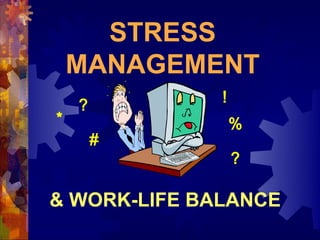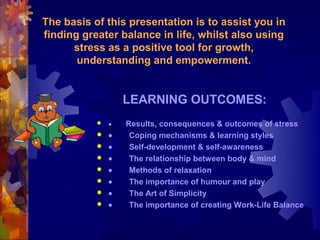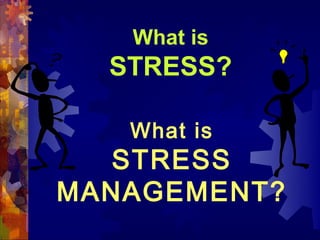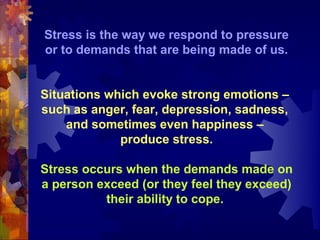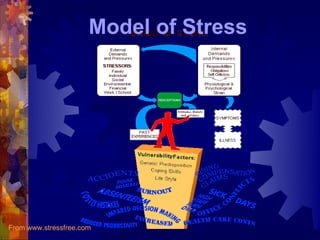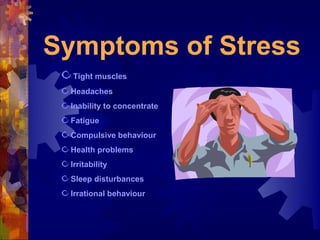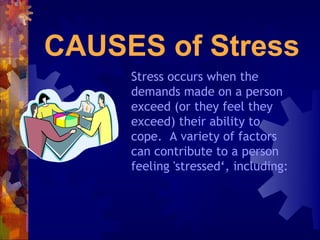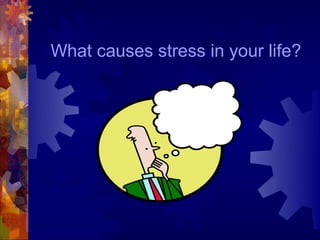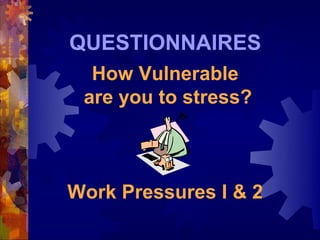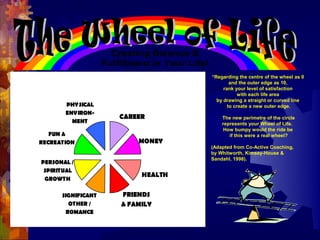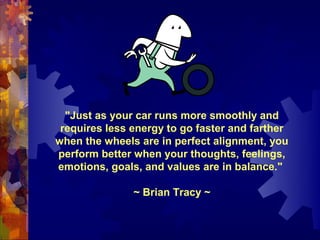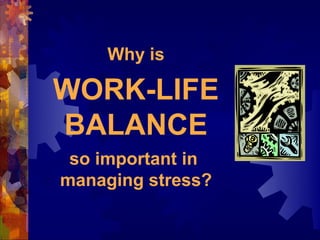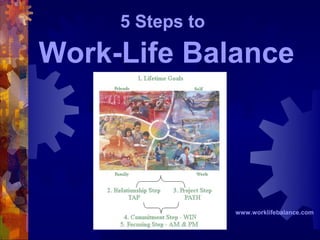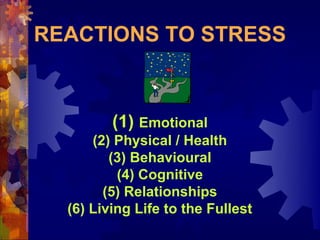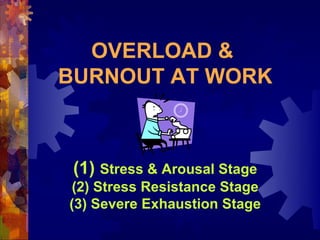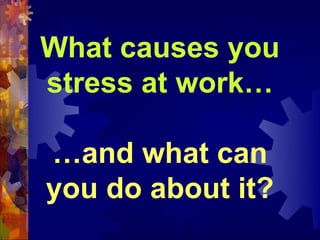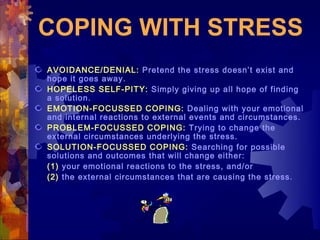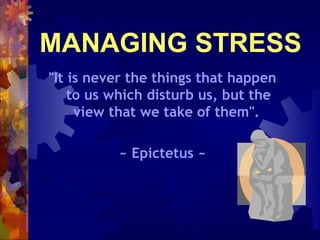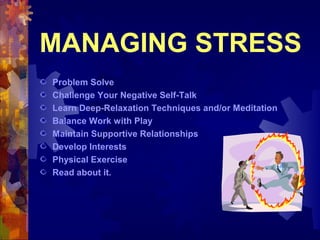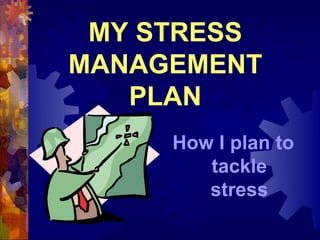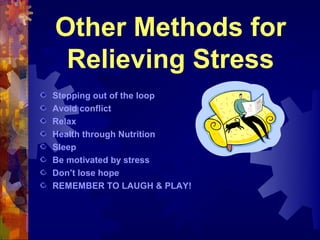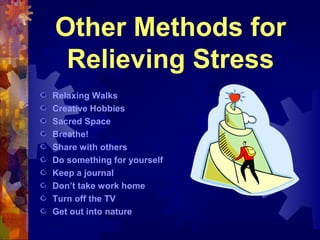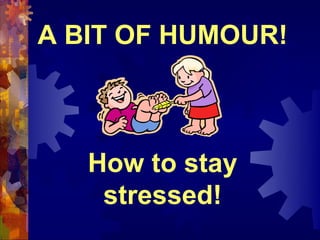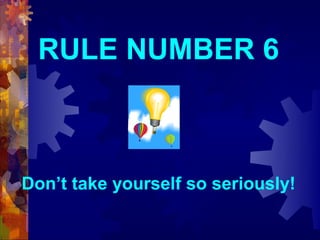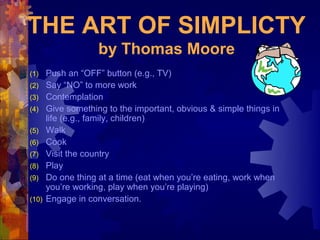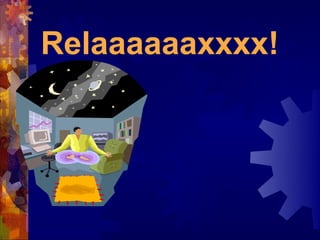Stress management
- 1. STRESS MANAGEMENT ! ? * % # ? & WORK-LIFE BALANCE
- 2. The basis of this presentation is to assist you in finding greater balance in life, whilst also using stress as a positive tool for growth, understanding and empowerment. LEARNING OUTCOMES:  •        Results, consequences & outcomes of stress  •        Coping mechanisms & learning styles  •        Self-development & self-awareness  •        The relationship between body & mind  •        Methods of relaxation  •        The importance of humour and play  •        The Art of Simplicity  •        The importance of creating Work-Life Balance
- 3. What is STRESS? What is STRESS MANAGEMENT?
- 4. Stress is the way we respond to pressure or to demands that are being made of us. Situations which evoke strong emotions – such as anger, fear, depression, sadness, and sometimes even happiness – produce stress. Stress occurs when the demands made on a person exceed (or they feel they exceed) their ability to cope.
- 5. Model of Stress From www.stressfree.com
- 6. Symptoms of Stress Tight muscles Headaches Inability to concentrate Fatigue Compulsive behaviour Health problems Irritability Sleep disturbances Irrational behaviour
- 7. CAUSES of Stress Stress occurs when the demands made on a person exceed (or they feel they exceed) their ability to cope. A variety of factors can contribute to a person feeling 'stressed‘, including:
- 8. What causes stress in your life?
- 9. STRESS & PERFORMANCE: Stress can be good for you! Research has shown that as stress levels rise, performance and motivation increases. However, once stress exceeds an optimal level, performance drops dramatically. Moral of the Story: A moderate amount of stress = peak performance. Like anything in life, too much or too little stress is not good for you.
- 10. QUESTIONNAIRES How Vulnerable are you to stress? Work Pressures I & 2
- 11. Creating Balance & Fulfillment in Your Life! “Regarding the centre of the wheel as 0 and the outer edge as 10, rank your level of satisfaction with each life area by drawing a straight or curved line PHY SICAL to create a new outer edge. ENVIRON- CAREER The new perimetre of the circle MENT represents your Wheel of Life. How bumpy would the ride be FUN & if this were a real wheel? RECREATION MONEY (Adapted from Co-Active Coaching, by Whitworth, Kimsey-House & Sandahl, 1998). PERSONAL / SPIRITUAL HEALTH GROWTH SIGNIFICANT FRIENDS OTHER / & FAMILY ROMANCE
- 12. "Just as your car runs more smoothly and requires less energy to go faster and farther when the wheels are in perfect alignment, you perform better when your thoughts, feelings, emotions, goals, and values are in balance." ~ Brian Tracy ~
- 13. Why is WORK-LIFE BALANCE so important in managing stress?
- 14. 5 Steps to Work-Life Balance www.worklifebalance.com
- 15. REACTIONS TO STRESS (1) Emotional (2) Physical / Health (3) Behavioural (4) Cognitive (5) Relationships (6) Living Life to the Fullest
- 16. OVERLOAD & BURNOUT AT WORK (1) Stress & Arousal Stage (2) Stress Resistance Stage (3) Severe Exhaustion Stage
- 17. What causes you stress at work… …and what can you do about it?
- 18. COPING WITH STRESS AVOIDANCE/DENIAL: Pretend the stress doesn’t exist and hope it goes away. HOPELESS SELF-PITY: Simply giving up all hope of finding a solution. EMOTION-FOCUSSED COPING: Dealing with your emotional and internal reactions to external events and circumstances. PROBLEM-FOCUSSED COPING: Trying to change the external circumstances underlying the stress. SOLUTION-FOCUSSED COPING: Searching for possible solutions and outcomes that will change either: (1) your emotional reactions to the stress, and/or (2) the external circumstances that are causing the stress.
- 19. MANAGING STRESS "It is never the things that happen to us which disturb us, but the view that we take of them". ~ Epictetus ~
- 20. MANAGING STRESS Problem Solve Challenge Your Negative Self-Talk Learn Deep-Relaxation Techniques and/or Meditation Balance Work with Play Maintain Supportive Relationships Develop Interests Physical Exercise Read about it.
- 21. MY STRESS MANAGEMENT PLAN How I plan to tackle stress
- 22. Other Methods for Relieving Stress Stepping out of the loop Avoid conflict Relax Health through Nutrition Sleep Be motivated by stress Don’t lose hope REMEMBER TO LAUGH & PLAY!
- 23. Other Methods for Relieving Stress Relaxing Walks Creative Hobbies Sacred Space Breathe! Share with others Do something for yourself Keep a journal Don’t take work home Turn off the TV Get out into nature
- 24. A BIT OF HUMOUR! How to stay stressed!
- 25. RULE NUMBER 6 Don’t take yourself so seriously!
- 26. THE ART OF SIMPLICTY by Thomas Moore (1) Push an “OFF” button (e.g., TV) (2) Say “NO” to more work (3) Contemplation (4) Give something to the important, obvious & simple things in life (e.g., family, children) (5) Walk (6) Cook (7) Visit the country (8) Play (9) Do one thing at a time (eat when you’re eating, work when you’re working, play when you’re playing) (10) Engage in conversation.
- 27. Relaaaaaaxxxx!

